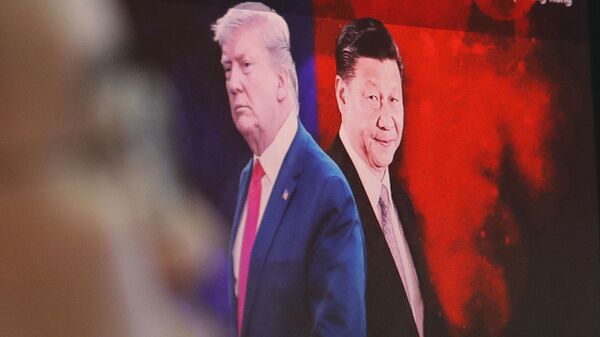On Wednesday, Donald Trump accused China of going to great lengths to sabotage his possible re-election during the 2020 presidential polls.
The Chinese Foreign Ministry hit back arguing that Beijing has no interest whatsoever in meddling in the 2020 US presidential election, the outcome of which can hardly be predicted, as many agree, at this both politically and economically tumultuous time.
According to Tiberio Graziani, chairman of Vision & Global Trends, International Institute for Global Analyses, “the general climate of mistrust among all Americans" is in the long run most likely to reward the candidate “who will best be able to negotiate with the US lobbies, the Fed, and the Pentagon from now to November and who, above all, will demonstrate his reliability".
In the event of Joe Biden taking the reins of the US administration, “the great US strategy in the international arena” will stay as is, the expert alleges, indirectly underpinning Beijing’s assurances of having no interest in America's domestic affairs. The enemies will always be Beijing and Moscow: “the two lungs of the Eurasian continental mass", as he puts it, continuing to say that there are different ways that Washington may fulfil its strategy:
“Probably, the new administration will try to play, depending on convenience, Moscow against Beijing, Beijing against Moscow, New Delhi and Moscow against Beijing".
When it comes to foreign policy and the new president’s potential course, “neither Trump nor Biden appear to understand or support such a basic and urgent need of humanity" - “a better future than created by neoliberalism", says Paolo Raffone, a strategic analyst and director of the CIPI Foundation in Brussels.
He says Biden’s proposals for the global arena do “not inspire nor challenge any of the grave bipartisan American foreign policy mistakes of the past decades".
With regard to China and potential multilateralism, the expert alleges that whoever is in power, “the US establishment would be ready to tolerate only those that would stop its high-tech progress and focus only on low-end industries, unable to compete with the US and the West in high-end manufacturing".
The political aspiration is “nonsensical", the analyst asserts, remarking that it may only be implemented by “physically destroying China".
“Such a ferocious American policy is driven by the refusal [to acknowledge] of their own mistakes. In fact, in the last three decades, Beijing has invested in research, development and infrastructure, while Washington has conducted endless wars and engaged in speculative finance", the expert drew parallels elaborating on the “grave bipartisan mistakes".
Pondering on Dems’ and Republicans’ foreign policy approaches, he says “Democrats do not score well” in the field.
Currently, Americans are split along party lines over President Donald Trump’s trade policy toward China, according to an in-depth survey from the University of Maryland, with presumed Dem nominee Joe Biden denouncing the trade war in summer 2019 as “damaging”. However, when it comes to geopolitics in the Asian region, the Democrats’ stance largely echoes that of Republicans. For instance, in 2016, Biden portrayed the Trans-Pacific Partnership - between the US, Australia, Brunei, Canada, Chile, Japan, and other states - as much a geopolitical agreement as an economic deal.
As part of the Obama administration, Biden supported the agreement as one that would help the US "rebalance towards Asia" against a bolder Chinese foreign policy in the region. He also lambasted, as did many fellow Democrats and Republicans, Beijing’s firm stance on the South China Sea.
Raffone believes “Trump has a chance” to correct the historic mistakes, "but he cannot do it alone", the analyst argues noting that his bid to ruin the multilateralism shaped by Democratic presidents “is understandable” but “he may quickly need to fix his relations with Europe and Russia to bring China to a new Yalta". The potential focus on unilateralism - or the “what is good for America” approach - is also predicted by Alexander Gillespie, professor of international law at the University of Waikato in New Zealand, who believes Trump will actually improve “some of the international architecture".
Wednesday was not the first time Trump had fumed about China’s alleged interest in - and concern about - the outcome of a domestic election. Back in 2018, he claimed that Beijing was trying to interfere with the midterm polls in revenge for the slew of tariffs he had slapped on billions of dollars’ worth of Chinese-manufactured goods.
During a United Nations Security Council meeting at the time, Trump asserted that Beijing doesn't “want me or us to win because I am the first president to ever challenge China on trade”.
Washington and Beijing, meanwhile, remain engulfed in a trade spat over what Trump has branded as unfair economic conditions, with the accusation spawning several rounds of tariff exchanges between the countries in recent years. However, there seems to be light at the end of the tunnel: late last year, the sides praised their efforts after they had worked out a phase one trade deal as part of a more comprehensive bilateral agreement that would help resolve long-standing bilateral trade issues.
The views and opinions expressed in the article do not necessarily reflect those of Sputnik.



